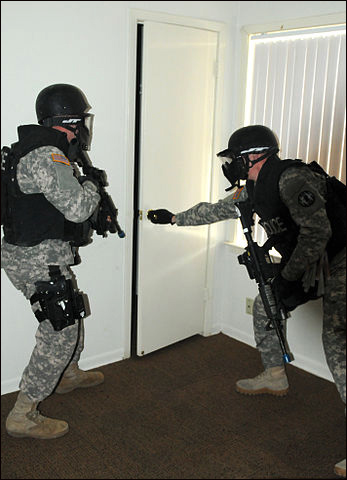
Stems from case in which police conducted an illegal entry prior to obtaining warrant
Adan Salazar
Infowars.com
December 18, 2013
A ruling by the Texas Court of Criminal Appeals last week opens the door for Texas law enforcement to obtain search warrants “based on predictions of the commission of future crimes,” an appeals judge

has stated.
The ruling came in the 2010 case of a man who police allege was “fixing to” cook methamphetamine.
Parker County police had been staking out suspect Michael Fred Wehren’s house for over a month.
When an informant tipped them off that Wehren and others were preparing to manufacture a batch of meth, police entered the home after midnight and detained Wehren and his friends outside his home in handcuffs.
Police then entered the home and located pseudoephedrine, stripped lithium batteries and other materials typically used to cook meth.
Only after police illegally entered Wehren’s home did they secure a search warrant from a judge. Of course, their request made sure not to mention the fact they had already entered the house and seized what they were looking for.
During trial, Wehrenberg’s lawyers argued the evidence was inadmissible as it had been obtained through deceptive means.
“The motion was denied,” writes Eric Nicholson for the Dallas Observer, adding, “the trial court cited federal ‘independent source doctrine,’ which allows illegally seized evidence a third party told them about beforehand — and Wehrenberg pleaded guilty to one count of possession and one count of intent to manufacture, getting five years in prison.”
Wehren’s lawyers appealed the verdict to the Second Court of Appeals in Fort Worth on the grounds that evidence used to convict him should have initially been excluded.
While that court sided with Wehren’s lawyers, judges with the Texas Court of Criminal Appeals, which ultimately has the final say, agreed with the trial court’s decision, saying the confidential informant’s tip could be construed as being within the guidelines of the federal “independent source doctrine.”
One judge offered a sound basis for dissenting with the majority, ominously concluding the ruling meant “search warrants may now be based on predictions of the commission of future crimes.”
“There was more than enough time to secure a search warrant before the officers’ intrusion into the premises, but they deliberately chose not to attempt to obtain it until after they had conducted the unlawful entry,” wrote Judge Lawrence E. Meyers in his dissenting opinion.
“Further, had the officers entered the home and found the occupants only baking cupcakes, the officers would not have bothered to then obtain the warrant at all. It was only after unlawfully entering and finding suspicious activity that they felt the need to then secure the warrant in order to cover their tracks and collect the evidence without the taint of their entry.”
“Further,” Meyers continued, “even if the search warrant was based exclusively on the confidential informant’s information, it still would not be valid. The informant’s tip that Appellant and his group were ‘fixing to’ cook methamphetamine that evening was a prediction of a future crime rather than an assertion that a crime was being or had been committed. Probable cause for a search warrant cannot be based on anticipation of a prospective crime.”







Holy shit! I didn’t realize the movie “Minority Report” was a documentary! So now the costumed thugs can invade any home if they think you might be doing something our masters disapprove of. Guess it’s time to keep the 12 gauge within reach at all times; I will take out as many of these maggots as possible before they get me.
It was inevitable. After all, the random checkpoints and TSA gate rape amount to the same thing – in principle: Presumption of guilt until demonstrated otherwise to the satisfaction of a state goon.
But the cattle out there will still put their hands over their hearts and pledge allegiance to the flag come 4th of July.
I don’t “pledge” anymore. Nor do I sing the anthem or any other rot gut excuse to praise the state. This is clearly an abomination born in the very state that supposedly will stand and be counted among the ones facing down the feds.
Yeah,…. as if.
“The right of the people to be secure in their persons, houses, papers, and effects, against unreasonable searches and seizures, shall not be violated, and no Warrants shall issue, but upon probable cause, supported by Oath or affirmation, and particularly describing the place to be searched, and the persons or things to be seized.”
Amendment IV of the Constitution of the united States of America
“SEARCHES AND SEIZURES. The people shall be secure in their persons, houses, papers and possessions, from all unreasonable seizures or searches, and no warrant to search any place, or to seize any person or thing, shall issue without describing them as near as may be, nor without probable cause, supported by oath or affirmation.”
Article 1 Section 9 of the Constitution for the state of Texas
Clearly, the Texas court uses the pages from these documents as tolit paper! At the time of the illegal search and seizure it was impossible for any of the officers or the informant to take an oath or affirmation that a crime had been committed. Therefore, the items found, were the fruits of a poisonous vine and should have never been used as evidence in a trial.
I guess one of the last options would be for the defendant to petition the federal courts for a redress of grievance and relief under the 14 Amendment Section 1 of the Constitution for the united States of America for a violation of the “privileges and immunities” that citizens of the U.S. supposedly enjoys. But then again, it would most likely be a waste of time. Aren’t we all enjoying living in a police state?
The new laws written in 2003 by a majority of Republicans in the Tx. Legislature are a travesty to anything remotely resembling fair play. The Brady Bill’s spray and pray portion gives the feds the right to inject themselves into any case if there is a single, non-functioning gun on the premises. Of course the feds can always find reason anyway. Tx. counties have made fortunes from the search and seizure laws. It’s big biz.